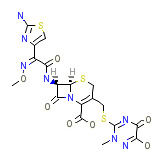Cefatriaxone




Cefatriaxone Brand names, Cefatriaxone Analogs
Cefatriaxone Brand Names Mixture
- No information avaliable
Cefatriaxone Chemical_Formula
C18H18N8O7S3
Cefatriaxone RX_link
http://www.rxlist.com/cgi/generic3/ceftriax.htm
Cefatriaxone fda sheet
Cefatriaxone msds (material safety sheet)
Cefatriaxone Synthesis Reference
M. Montavon, R. Reiner, Brit. pat. Appl. 2,022,090; eidem, U.S. pat. 4,327,210 (1979, 1982 both to Hoffmann-La Roche)
Cefatriaxone Molecular Weight
554.583 g/mol
Cefatriaxone Melting Point
>155 oC
Cefatriaxone H2O Solubility
No information avaliable
Cefatriaxone State
Solid
Cefatriaxone LogP
-1.341
Cefatriaxone Dosage Forms
IM infusion;
Cefatriaxone Indication
For the treatment of the infections (respiratory, skin, soft tissue, UTI, ENT) caused by S. pneumoniae, H. influenzae, staphylococci, S. pyogenes (group A beta-hemolytic streptococci), E. coli, P. mirabilis, Klebsiella sp, coagulase-negative staph
Cefatriaxone Pharmacology
Ceftriaxone is a cephalosporin/cephamycin beta-lactam antibiotic used in the treatment of bacterial infections caused by susceptible, usually gram-positive, organisms. Ceftriaxone has in vitro activity against gram-positive and gram-negative aerobic and anaerobic bacteria. The bactericidal activity of Ceftriaxone results from the inhibition of cell wall synthesis and is mediated through Ceftriaxone binding to penicillin binding proteins (PBPs). Ceftriaxone is stable against hydrolysis by a variety of beta-lactamases, including penicillinases, and cephalosporinases and extended spectrum beta-lactamases.
Cefatriaxone Absorption
No information avaliable
Cefatriaxone side effects and Toxicity
No information avaliable
Cefatriaxone Patient Information
Patient Information:
Patients should be counseled that antibacterial drugs including Ceftriaxone should only be used to
treat bacterial infections. They do not treat viral infections (eg, common cold). When Ceftriaxone
is prescribed to treat a bacterial infection, patients should be told that although it is common
to feel better early in the course of therapy, the medication should be taken exactly as directed.
Skipping doses or not completing the full course of therapy may (1) decrease the effectiveness of
the immediate treatment and (2) increase the likelihood that bacteria will develop resistance and
will not be treatable by Ceftriaxone or other antibacterial drugs in the future.
Patients should be counseled that antibacterial drugs including Ceftriaxone should only be used to
treat bacterial infections. They do not treat viral infections (eg, common cold). When Ceftriaxone
is prescribed to treat a bacterial infection, patients should be told that although it is common
to feel better early in the course of therapy, the medication should be taken exactly as directed.
Skipping doses or not completing the full course of therapy may (1) decrease the effectiveness of
the immediate treatment and (2) increase the likelihood that bacteria will develop resistance and
will not be treatable by Ceftriaxone or other antibacterial drugs in the future.
Cefatriaxone Organisms Affected
Enteric bacteria and other eubacteria














